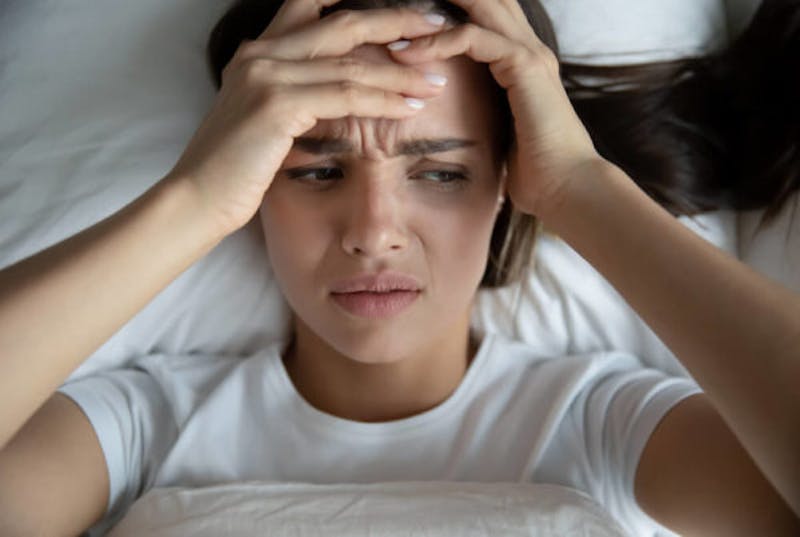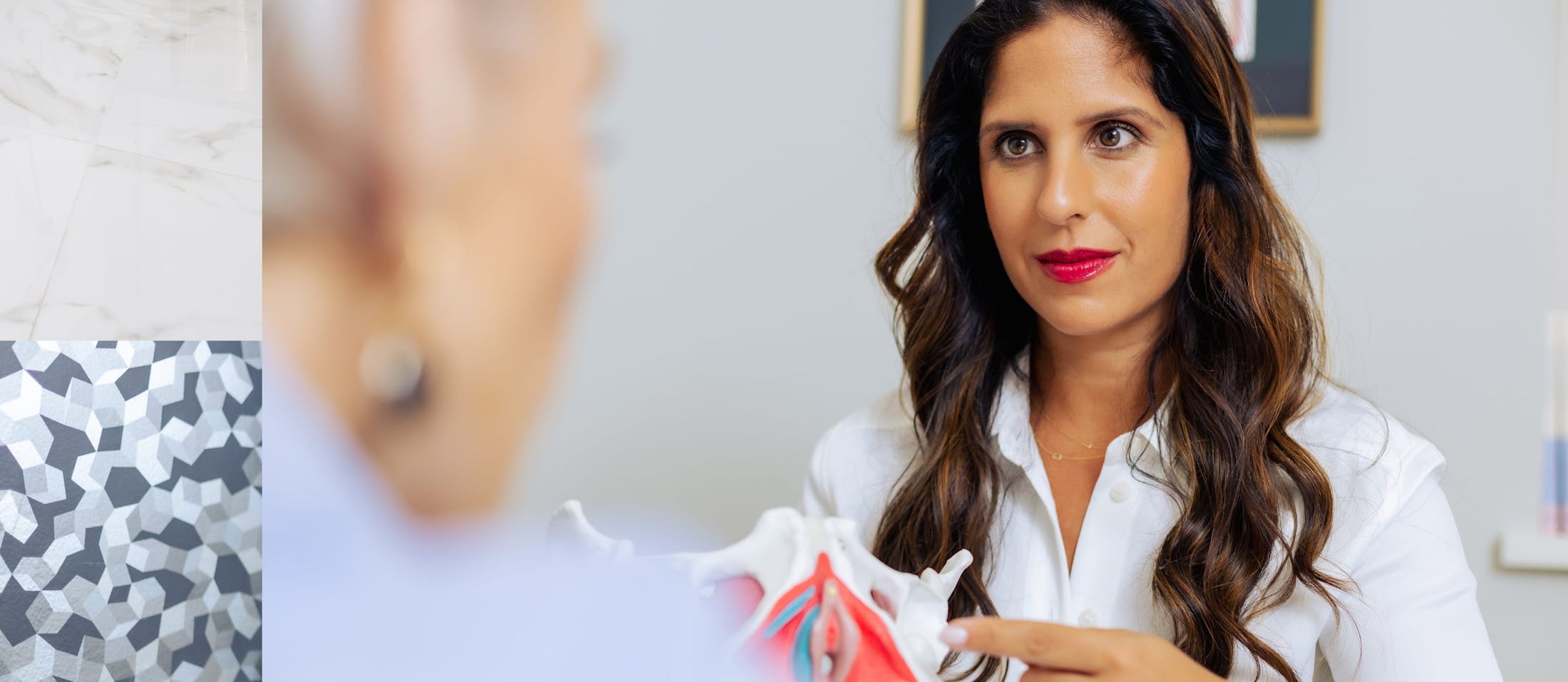
Let’s get straight to it. We can pretty much agree that pain in the vulva can be disruptive and painful. And beyond physical symptoms, vulvar pain often causes confusion, distress, or anxiety, too.
“Why does my vagina feel raw?” you say. Or, “I feel a burning around my vagina!” What do these symptoms mean? Vulvar pain could be a sign of vulvodynia — a chronic pain around the vaginal opening that typically doesn’t have one specific cause. Rest assured, however, Dr. Sonia Bahlani can help you move from pain to freedom, and that starts with understanding what vulvodynia is and how it can be prevented and treated.
In this post, Dr. Bahlani will answer:
Table of Contents
What is Vulvodynia?What do vulvodynia symptoms look and feel like?What causes vulvodynia?How does vulvodynia affect my life?How is vulvodynia diagnosed?Can vulvodynia go away with treatment?Taking Care of Yourself
What is Vulvodynia?
Before we get into what vulvodynia is, let’s make sure we’re on the same page about the difference between the vulva and the vagina. Oftentimes, we use “vagina” as a catch-all for describing female genitalia, when, in fact, the vagina is only the internal canal between the external genitals and the cervix. The vagina is the birth canal. It’s how your menstrual flow travels from your uterus to outside your body.
In contrast, when your doctor talks about your vulva, they’re referring to all the female external genitalia: the pubic mound (mons pubis), the inner and outer labia (labia minora and majora), the clitoris, the external openings of the urethra (where you pee from), plus the vagina. So, really, the vulva is all of it, while the vagina is just the internal canal.
At Pelvic Pain Doc, we understand it can be difficult to say words like “vulva” and “vagina” or talk about genital issues. Rest assured, your Roslyn and Manhattan, NY pelvic pain specialist, Dr. Bahlani, is here to help you feel comfortable talking about your pelvic pain issues with sensitivity and patience. A great first step to discussing your pelvic health with ease is knowing the correct terms — the right terminology can help you in describing your pain as accurately as possible to your pelvic pain specialist. And allow you to become a better advocate for your own pelvic health!
So back to vulvodynia. We can define vulvodynia as a chronic pain or discomfort felt in the vulvar region that you’ve had for at least three consecutive months. Unfortunately, it has no identifying cause — like an infection or skin disorder. And vulvodynia doesn’t typically have any extreme visible signs, although sometimes painful areas can look swollen or a little inflamed.
Two types of vulvodynia
There are two types of vulvodynia: localized and generalized. With the first, you feel pain in one place only, say, the opening of the vagina (called the vestibule). The majority of women who suffer from vulvodynia have this kind of pain, called vestibulodynia. Pain with localized vulvodynia, like vestibulodynia, arises during or after pressure that’s put on the vaginal opening. Events like the following can trigger the pain:
sexual intercourseInserting a tamponA gynecologic examWearing tight pantsSitting for too long
Women can also experience a type of localized vulvodynia in the clitoris called clitorodynia.
Generalized vulvodynia is when pain happens without pressure applied and typically in other areas of the vulva such as near the clitoris, on the labia majora, or the perineum. The pain from this kind of vulvodynia is usually constant but with some stretches of symptom relief. Activities like sexual intercourse or prolonged sitting can cause generalized vulvodynia pain to flare up.
What do vulvodynia symptoms look and feel like?
It’s easy to see that pain is the most obvious symptom of vulvodynia, however, the pain experience does vary from one patient to the next. As mentioned at the beginning of this post, some women feel a burning sensation around their vagina. Others describe a raw feeling. And sometimes vulvodynia feels like the sensations you get when you have a UTI (urinary tract infection). Other symptoms of vulvodynia include:
an itching sensationthrobbing of the vulvar areaa stinging feelingSorenessA sharp, stabbing, “knife-like” pain
What causes vulvodynia?
We don’t know of one specific cause of vulvodynia yet, but Dr. Bahlani can narrow it down to a few suspected causes depending on a patient’s health history. Vulvodynia can be associated with:
Past vaginal infectionsInjury or trauma to the vulvar areaHormonal changesAllergies or sensitive skinReactions to certain foodsDisorders in the pelvic floorMuscle spasms or a weak pelvic floorGenetic factorsOther health conditions like diabetesNeuroproliferative changes
We should mention that vulvodynia isn’t always acting alone. Women with vulvodynia often concurrently suffer from conditions affecting their overall health or other areas of the body. Painful bladder syndrome, fibromyalgia, irritable bowel syndrome, or TMJD — temporomandibular disorder — are all common examples.
How does vulvodynia affect my life?
It goes without saying that, more often than not, vulvodynia has a heavy impact on a woman’s quality of life. The vulvar pain itself can be intensely disruptive and stressful. Not to mention the strain on intimate relationships if you’re experiencing pain during sex, or the feeling of isolation if you feel ashamed to talk about it or seek help. Vulvodynia has also been shown to cause anxiety, depression and disturb your sleep. At Pelvic Pain Doc, we want our patients to live healthy, whole, and happy. Thankfully, Dr. Bahlani can provide the expert diagnosis and treatment to help you get there if you’re suffering from vulvodynia.
How is vulvodynia diagnosed?
When you visit our office, Dr. Bahlani will first rule out other conditions that might be the cause of your pelvic pain. These other issues include yeast or bacterial infections, herpes, precancerous skin conditions, or genitourinary syndrome of menopause. The last is a fancy way of describing signs and symptoms of menopause.
We’ll also have a conversation with you about your medical history and ask you specifics about your pain — where it hurts and how severe. At Pelvic Pain Doc, we value frank and honest communication about your pelvic health to help you get the most accurate diagnosis and treatment. If you’re unused to talking about genital issues, we’ll work together to ensure you feel safe and comfortable discussing your symptoms.
Typically, Dr. Bahlani also does a physical exam, touching areas around the vulva with a cotton swab to evaluate the location and intensity of your pain. She might also perform a pelvic exam to assess your pelvic floor muscles or ask for a swab to test for infections. Sometimes, a biopsy is recommended, but only if Dr. Bahlani finds a lesion or sees any abnormalities.
Can vulvodynia go away with treatment?
Yes! Yes, it can. With the right treatment and care from a pelvic pain specialist like Dr. Bahlani, your vulvodynia can become a distant memory. Now, we want to mention that it’s just as important to treat the emotional trauma of vulvodynia as it is the condition itself. We know pelvic pain can affect your mental and emotional health and we want to see our patients achieve wellness all around. If vulvodynia has caused you emotional pain and trauma, Dr. Bahlani suggests psychotherapy or counselling in concert with physical treatment.

Just as the symptoms of vulvodynia vary from person to person, vulvodynia treatment is also unique to each person in response. No single treatment is effective for all women, but a combination of therapies that takes into account health history and specific experience can bring you back to a pain-free, vibrant life. Treatment options include:
Topical ointments or creams – These contain anesthetics or nerve-stabilizing medications. You apply these creams to the vulvar region where you’re experiencing pain and sometimes these are recommended for use before sexual intercourse. Some creams — called compound creams — combine several medications into one, like antidepressant medication with an anesthetic.
Oral medications – Dr. Bahlani might prescribe antidepressants or anticonvulsants which address and alleviate nerve pain. Tricyclic antidepressants are the most common type prescribed for vulvodynia and are at a much lower dosage than when treating depression on its own. Anticonvulsants are sometimes an option for relieving shooting, stabbing-like pain symptoms.
Nerve block injections – This is medication that interrupts the pain signals from your vulva to the brain. The pain signals are carried by the pudendal nerve which innvervates the labia, vulva and clitoris in women. Nerve block injections are typically provided as a series over a prescribed course of days or weeks and many women report sustained symptom relief from these injections.
Changing up your diet: Sometimes women find that their vulvar pain flares up with certain foods. If this is the case for you, be sure to share this information with Dr. Bahlani who can provide suggestions for modifying your diet without sacrificing your nutritional health.
Other treatments and therapies – Your pelvic pain specialist might suggest the following therapies as well:
Biofeedback therapy to train your pelvic floor muscles to relaxPelvic floor physical therapyLocal anesthetics to temporarily relieve pain symptomsSurgical interventions
Taking Care of Yourself
At home, we suggest a few ways you can practice self-care and relieve vulvar pain as you go through medical treatment. Be gentle on yourself!
Avoid tight clothing and pantyhoseWear 100% cotton underwear Use cold compresses or gel packsAvoid exercises like cycling or horseback ridingOnly wash your vulva with water. Take a break from soap in the genital area and stay away from other possible irritants like deodorants, bubble bath, and douching.If you can still have intercourse, use plenty of lubricant but don’t use flavored ones or ones that create cooling/warming sensationsIf you have to sit down for prolonged periods, sit on a foam “donut” or other type of cushion to reduce pressure on the vulvar area. It might be a good time to try a standing desk!Seek out ways to lower your stress levelsGet those 40 winks in with adequate sleep and a regular sleep/wake schedule
With treatment, vulvodynia doesn’t have to overtake your life. You can live without pain and return to a healthy sex life, enjoy emotional well-being, and get back to the daily routines that bring you joy. Contact Pelvic Pain Doc to book a virtual or in-person consultation at our Manhattan or Roslyn office today.

